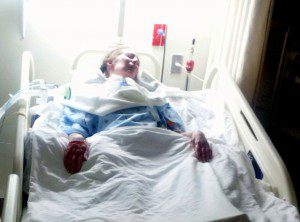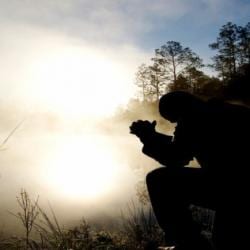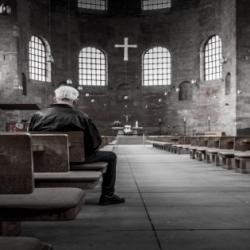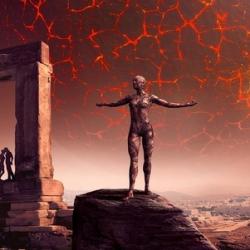
“Funny, profane and adamantly atheistic,” was the phrase the Washington Post used to describe me in a piece about my Skeptical Inquirer article, “Covert Cognition: My So-Called Near-Death Experience.” I’ve joked that I want that on my tombstone, but I’m not the sort of firebrand atheist the religious like to tote out as bogeymen, or in my case, bogeywomen.
I don’t go out of my way to confront believers. Indeed, because I was raised completely without religion, I feel a special discomfort around such people. I don’t like hurting people’s feelings, and I don’t want to inadvertently offend them. I have a nasty habit—related to my ADHD—of blurting out the first thing that pops into my head without thinking of the consequences. And due to my secular upbringing, I don’t always realize how offensive my comments might be perceived. That’s where fear of all three of the qualities listed by WaPo come into play, especially around clergy. In such company, I can easily become a live grenade…with a loose pin.
And that makes me feel nervous (and everyone else).
At some point, every time I’ve been in the hospital, a chaplain has entered my room and asked me if I wanted to speak with them. And each time, I’ve squirmed and tried not to sound too strident when I said no.
But on the day of my awakening from my coma, I didn’t have to worry about my tone of voice because I had none. My tracheostomy accomplished what no person had ever succeeded in doing—it shut me up. So on that disorienting day, when the priest at the Catholic nursing home (which wasn’t exactly my loved ones’ first choice) asked me if he could hold my hand, I couldn’t say no. Though I could barely lift my head, I could shake it. Yet I didn’t. It seemed impolite to refuse, so I gave him a slight nod instead.
My hands looked raw and quite frankly disgusting beneath their bandages due to the open ulcers caused by my then-active autoimmune disease. I worried that he might hurt my fragile skin, but he took my hand and gently laid it in his own. I suppose you can compare his gesture to Jesus’ healing of the lepers, though dermatomyositis isn’t communicable, and it wasn’t that kind of laying on of hands. (Nor was it the kind that Catholic priests have become notorious for.)
“Do you remember me?” he asked. I didn’t, but I nodded anyway.
He smiled beatifically at me for a painfully long time before finally saying, “God is good.”
I struggled to keep my eyes from rolling. That was the first time someone said my recovery was a miracle, but it wouldn’t be the last.
There was a interminable pause as he beamed at this living proof of God’s benevolence. Then he said, “Have you thanked God for your life?”
I shook my head as vigorously as I could, which admittedly wasn’t much after six weeks of complete immobility.
Now it was his chance to feel uncomfortable. There was a stunned silence as he absorbed my vehement response. He was clearly shocked, but he shouldn’t have been. My hospital records clearly stated that my religion was atheist. (Yes, atheism isn’t a religion. You can take that up with the hospital administration if you like.)
I thought, “I’m supposed to thank the god I don’t believe in for saving my life after he nearly killed me?”
There was another long, awkward moment while the priest shifted uneasily. Now he wanted to leave my room every bit as much as I wanted him to go. He quickly took his leave of this ungrateful atheist, but not before asking, “May I pray for you?”
I just wanted to get this over with. But I recognize that prayers are really for the prayer, so I reluctantly nodded. I would’ve given a resigned sigh if my trach allowed me. I don’t remember exactly what he said because I let my mind drift away. Wah, wah, God something, wah. Then he left me in peace, finally free of God’s grace.
While this was my first encounter with clergy during my recovery, it wouldn’t be the last. And the next time brought me face to face with the mendacious hospital chaplain my secular loved ones had clashed with during my coma.
Those stories will be the subject of a future post.















